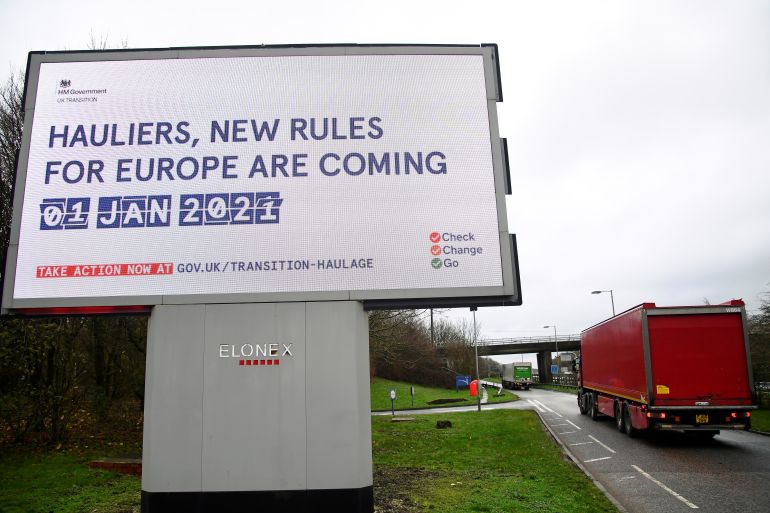Ten days until Brexit transition ends: What to know in 500 words
The UK and the EU are yet to compromise and reach a trade deal, with less than two weeks until the agreed deadline.

The United Kingdom and European Union are running out of time to forge a deal on their post-Brexit trading relationship and avoid a messy divorce.
The Brexit transition period is set to end on December 31. The UK will exit the EU’s single market and customs union – 11 months after it formally left the bloc in January.
Keep reading
list of 4 items‘Smooth glide path’ or rough landing? Firms brace for hard Brexit
UK-EU fisheries dispute threatens to sink post-Brexit trade deal
Mutant virus adds to Brexit concerns as UK suppliers sound alarm
The window was carved out to offer negotiators on both sides time to hammer out an agreement, while the UK remained bound to the EU’s rules in the interim, in order to minimise disruption to either party.
Both sides are keen to strike an agreement, but talks have been mired in deadlock amid persistent division over fishing rights and competition rules.
The UK has called for the EU to withdraw “unreasonable demands” that it says do not respect the country’s sovereignty.
“We want these talks to reach a positive conclusion, of course, I want a deal, I think everybody wants a deal,” UK Health Secretary Matt Hancock said on Sunday.
“Unfortunately, the EU have put in some unreasonable demands … They do not respect the result of the referendum,” he added, citing the June 2016 poll which saw a majority of Britons vote to leave the EU.
The bloc is determined to protect its lucrative single market and is against any deal which offers London preferential market access while allowing it to set its own rules.
The bloc’s chief Brexit negotiator, Michel Barnier, on Sunday said it remained “committed to a fair, reciprocal and balanced agreement”.
“We respect the sovereignty of the UK. And we expect the same,” he said.
A deal would mean a less chaotic breakup, but both sides will still need to get the agreement approved by their respective parliaments.
UK Parliament would likely sign off the deal before the year ends, because Johnson’s ruling Conservative Party has a strong majority.
But things are more complicated on the EU side, with the leaders of its 27 member states required to approve of any agreement before it is sent to the European Parliament for its consent.
It is not clear if there is sufficient time for that process to be completed before December 31, although EU law does include a provision for agreements to be signed and applied provisionally, without its parliament’s consent.
A no-deal scenario would likely result in disruptions at UK-EU border points and political acrimony.
Such a scenario is also predicted to deliver an economic shock for both sides, with a no-deal Brexit forcing them default to the World Trade Organization (WTO) rules from January 1.
WTO rules would bring financial tariffs, quotas and other regulatory barriers to trade into play, potentially affecting hundreds of billions of pounds worth of annual trade between the UK and the EU.
If no deal is reached, the UK and the EU could conceivably continue to hold talks from 2021 onwards.
A third scenario in which the transition period is extended is conceivably possible amid chaos sparked by the COVID pandemic. However, UK officials are against making such a move.